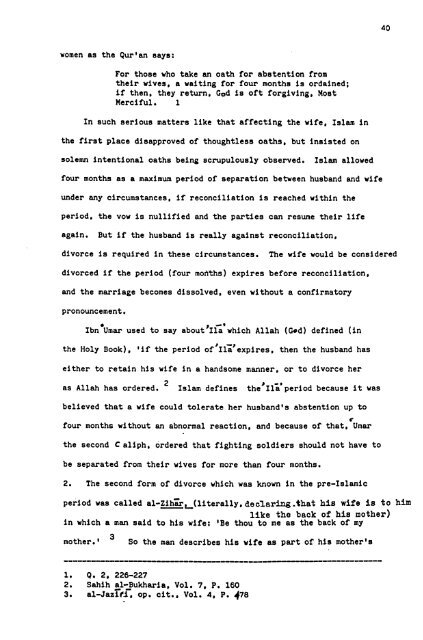Download - University of Salford Institutional Repository
Download - University of Salford Institutional Repository
Download - University of Salford Institutional Repository
Create successful ePaper yourself
Turn your PDF publications into a flip-book with our unique Google optimized e-Paper software.
women as the Qurlan says:<br />
For those who take an oath for abstention from<br />
their wives, a waiting for four months is ordained;<br />
if then, they return, Gcod is <strong>of</strong>t forgiving. Most<br />
Merciful. 1<br />
In such serious matters like that affecting the wife. Islam in<br />
the first place disapproved <strong>of</strong> thoughtless oaths, but insisted on<br />
solemn intentional oaths being scrupulously observed. Islam allowed<br />
four months as a maximum period <strong>of</strong> separation between husband and wife<br />
under any circumstances, if reconciliation is reached within the<br />
period. the vow is nullified and the parties can resume their life<br />
again. But if the husband is really against reconciliation.<br />
divorce is required in these circumstances. The wife would be considered<br />
divorced if the period (four mohths) expires before reconciliation.<br />
and the marriage becomes dissolved, even without a confirmatory<br />
pronouncement.<br />
00<br />
ý*<br />
Ibn Umar used to say about Ila which Allah (God) defined (in<br />
the Holy Book). 'if the period <strong>of</strong> IF<br />
I17apexpires, then the husband has<br />
either to retain his wife in a handsome manner. or to divorce her<br />
as Allah has ordered.<br />
2<br />
Islam defines theoIli'period because it was<br />
believed that a wife could tolerate her husband's abstention up to<br />
C<br />
four months without an abnormal reaction, and because <strong>of</strong> that, Umar<br />
the second C aliph, ordered that fighting soldiers should not have to<br />
be separated from their wives for more than four months.<br />
2. The second form <strong>of</strong> divorce which was known in the pre-Islamic<br />
period was called al-ZiharL_(literally, declaring. that his *if 9 is to him<br />
like the back <strong>of</strong> his mother)<br />
in which a man said to his wife: 'Be thou to me as the back <strong>of</strong> my<br />
mother. j3 So the man describes his wife as part <strong>of</strong> his mother's<br />
1. Q. 2.226-227<br />
2. Sahih al-Bukharia, Vol. 7, P. 160<br />
3. al-Jaziei. op. cit., Vol. 4, P. 478<br />
40
















